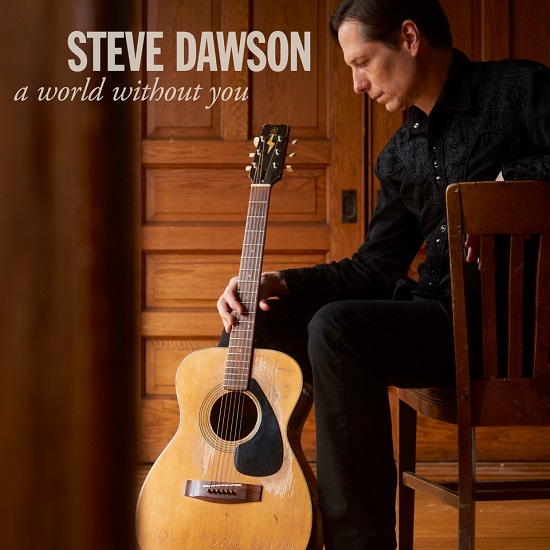
Our first review of 2022 and we thought we should start with a bit of confusion. Of the two Steve Dawsons that we now seem to feature regularly (because they’re both very, very good at what they do). This is the Chicago Steve Dawson as opposed to the Nashville Steve Dawson; the one who released the excellent “At the Bottom of a Canyon, In the Branches of a Tree” in June 2021. Steve had enough finished songs for a double album but “Canyon” was released as a single album; this left an album’s worth of oven-ready songs that Steve now intends to release as singles and possibly an EP. He’s releasing “A World Without You” to coincide with his British mini-tour starting at the Americana Music Association UK showcase in Hackney on January 25th.
The song is an example of a classic understated arrangement. It’s a simple, slow triple-time ballad, with a traditional four-piece backing given an added soulful edge with a sprinkling of piano and organ (courtesy of Alton Smith) and some lovely descending guitar arpeggios. Steve’s notes on the song tell us that he was aiming for a Merle Haggard feel with the song, but there’s also more than a hint of sixties/seventies Southern soul in there as well, Stax ballads or James Carr, maybe. Lyrically, you can interpret “A World Without You” as a straightforward break-up song, but Steve feels it’s more influenced by the loss of his in-laws. Either way, it’s a beautiful soul/country ballad.
“A World Without You” is released the UK on Friday January 21 on PravdaRecords.
You can see Steve Dawson in the UK at these places and dates in January:
Tue 25 London Hackney Social, AMA UK showcase
Wed 26 Leicester* The Musician
Thu 27 Birmingham* Kitchen Garden Cafe
Sat 29 Sheffield* The Greystones
Sun 30 Carshalton Cryer Arts Centre
*with The Fargo Railroad Co.
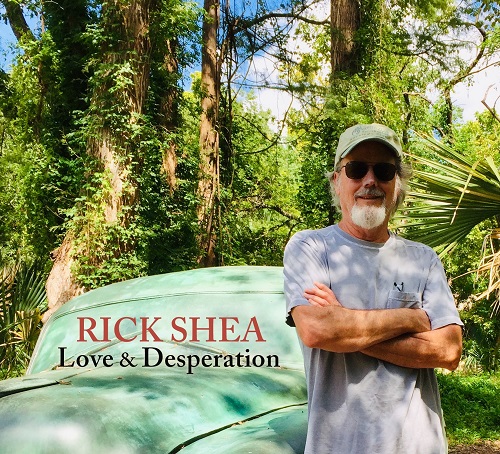
We’ve all been reminded over the last year that music is a social phenomenon. Musicians love to work together, in the same room, face to face. Most of them love to interact with audiences in the same way, up close and personal and we’ve missed out on that over the last ten months in the UK. But life goes on and we adapt; the conditions aren’t ideal but musicians are collaborating online and still producing great albums and singles. Rick Shea’s twelfth album “Love & Desperation” is one of those collaborations, started under fairly normal conditions in 2019 and completed under COVID conditions in 2020.
The playing throughout is subtle and understated; the album relies more on subtlety and nuance than technical wizardry for its impact (that and a tidy selection of songs across a range of styles, with a few little surprises thrown in) and some interesting song pairings across the album. The fact that Rick has a voice that bears comparison with Merle Haggard might also help a bit. There’s also a suggestion that, after forty years as a musician, Rick might be thinking about his legacy; there’s a hint of that with the inclusion of the moody and atmospheric Mexican noir story “Texas Lawyer”, which closes the album, which appears for the third time on one of Rick’s albums.
So, how about those pairs of songs? Well, “(Down at the Bar at) Gypsy Sally’s” (taking its title from Townes Van Zandt’s “Tecumseh Valley”) and “She Sang of the Earth” look at different diversions, one physical, the other spiritual, but equally temporary. The arrangements echo the themes for each song with a gentle country feel for “She Sang of the Earth” and a more sinister guitar and accordion-led styling for “Gipsy Sally’s”, which instantly evokes the Doors’ “People Are Strange”; and that’s appropriate given the list of characters that populate the song.
“Gipsy Sally’s” neatly ties in with “The World’s Gone Crazy”, tying in the Doors instrumental style to the lyrical style and structure of a gospel song; it’s another example of the album’s eclecticism, from the standard slow blues of “Blues at Midnight” to the mariachi polka of “Juanita (Why Are You So Mean?)”. The musical variety of the songs is matched by the range of lyrical themes from the album. There’s the love song “A Tenderhearted Love”, which Rick felt he owed his wife, the references to the harshness of Nashville in the title song “Nashville Blues”, and the environmental and social concerns of ”Big Rain is Comin’ Mama”.
There’s plenty of love running through this album; love for music, love for family and love for the world and, honestly, very little desperation. If this is Rick Shea’s shot at a career-defining album, then it might just have done the trick.
“Love & Desperation” is released in the UK on Friday February 12th on Tres Pescadores Records (TPCD-12).
Here’s the video for “The World’s Gone Crazy”:
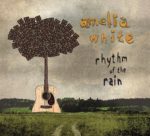 No, there’s no sign of a cover of The Cascades’ 1962 hit here; it’s all very much contemporary Americana. Amelia White’s style is very distinctive, and this is emphasised by the spontaneous feel of “Rhythm of the Rain”, which was made in four days at a very turbulent time in Amelia’s life. When she growls ‘Don’t think too much, people’ at the beginning of the title song, you can take a literal interpretation or a sarcastic one. Either works, it just depends wahich song you’re listening to. It’s certainly never going to be described a bundle of laughs, with “Yuma” and “Sugar Baby” dealing with addiction and “Sinking Sun” staring into depression.
No, there’s no sign of a cover of The Cascades’ 1962 hit here; it’s all very much contemporary Americana. Amelia White’s style is very distinctive, and this is emphasised by the spontaneous feel of “Rhythm of the Rain”, which was made in four days at a very turbulent time in Amelia’s life. When she growls ‘Don’t think too much, people’ at the beginning of the title song, you can take a literal interpretation or a sarcastic one. Either works, it just depends wahich song you’re listening to. It’s certainly never going to be described a bundle of laughs, with “Yuma” and “Sugar Baby” dealing with addiction and “Sinking Sun” staring into depression.
The musical stylings are pretty diverse, ranging from the adult-oriented-rock feel of “Sinking Sun” and “True or Not” to the laid-back Crazy Horse feel of “Supernova”. The album has a more raw, rockier edge than last year’s “Home Sweet Hotel”; although “Sugar Baby” opens with a menacing, ”Deliverance”-style banjo and eventually moves through the gears to “Sticky Fingers”-era Stones. Then there’s the title song, with a backbeat, swampy texture, and a sense of oppression and foreboding contrasted with the folky string band styling of the album’s closer which is enhanced by some nice Hammond organ.
There’s one song that stands out, even on an album packed with powerful songs and performances, and it’s a co-write with Lorne Entress and Lori McKenna. The skittering rhythms of “Said It Like a King” make the song feel like it’s rushing uncontrollably towards an unpleasant revelation; I may be looking for examples of this everywhere at the moment, but this song does sound like it might have been partly inspired by the leader of the free world. It’s about bullying and pulls together vignettes featuring a bully on the school bus, a hellfire preacher and a general delivering unpalatable messages which are accepted because each one “Said it like a king”. It’s a very clever lyrical idea, but the kicker comes in the final verse. No spoilers, you have to listen for yourself.
“Rhythm of the Rain” is an intense experience; even the opening song “Little Cloud Over Little Rock”, peeping into the lives of smalltown Americans having their Friday night fling to a soundtrack of Merle Haggard and George Jones is underpinned by the quiet desperation of the line ‘his friends are coming to drink their unemployment down.’ Is the album downbeat? Yep. Fraught? Sure. Compelling? Utterly.
“Rhythm of the Rain” is released in the UK on White-Wolf Records on Friday October 27th.
Amelia will be touring the UK in November. Check out the dates here.
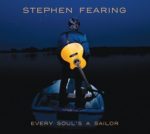 Do turbulent social and political conditions create a fertile environment for artists? It’s a theory that’s had some support and I suspect we’re about to see and hear a lot more evidence over the next few years. The inauguration hasn’t taken place yet but I’ve already heard a couple of anti-Trump songs. Rita Hosking has replied to the infamous pussy-grabbing comments with a song that suggests a prompt and effective remedy of a toecap to the testicles, and Stephen Fearing’s song “Blowhard Nation” on “Every Soul’s a Sailor” neatly skewers the braggadocio of the president-elect and the motives of his supporters. The Merle Haggard/outlaw country arrangement of the song stands apart from the rest of the album, highlighting the song’s message as a contrast to the gentler themes elsewhere.
Do turbulent social and political conditions create a fertile environment for artists? It’s a theory that’s had some support and I suspect we’re about to see and hear a lot more evidence over the next few years. The inauguration hasn’t taken place yet but I’ve already heard a couple of anti-Trump songs. Rita Hosking has replied to the infamous pussy-grabbing comments with a song that suggests a prompt and effective remedy of a toecap to the testicles, and Stephen Fearing’s song “Blowhard Nation” on “Every Soul’s a Sailor” neatly skewers the braggadocio of the president-elect and the motives of his supporters. The Merle Haggard/outlaw country arrangement of the song stands apart from the rest of the album, highlighting the song’s message as a contrast to the gentler themes elsewhere.
Stephen Fearing is a genuinely great singer/songwriter/guitar player with an equal emphasis on all three elements. The lyrical themes of the songs range from the elegaic “Gone but Not Forgotten”, through the melancholy regret of “Red Lights in the Rain” (as powerful an image as I’ve heard for leaving a relationship) to the regret for a passing era of “Things We Did”. The musical stylings are equally varied, from the AOR feel of the opener “Put Your Money Where your Mouth Is” to the raucous, rambunctious rebel stylings of “Blowhard Nation” which has maybe a hint of uptempo Jim Croce stylings thrown in as well. Each song has the perfect arrangement to emphasise its lyrical content and, whether it’s the skiffle/rockabilly feel of “Love Like Water” with acoustic guitar and stand-up bass, to the album’s closer “Every Soul’s A Sailor” with a close-miked vocal, two electric guitars and no bass or drums. It’s an unusual voicing, but it’s just right for the song, and that’s what it’s all about.
This is an album where the standards are high throughout whether you’re interested in well-constructed and inspired songs, evocative arrangements or outstanding vocal performances. There are no weak spots and dozens of highlights.
I’ll leave you with a lyric from “Blowhard Nation” concerning politicians generally:
‘Make no mistake, when they’re showing you the cake, they’ll never let you eat it now’ We might just be entering a new era of protest songs.
“Every Soul’s A Sailor” is released on Friday February 3rd on LowdenProud Records (LOWD60161)
 Keegan McInroe seems pretty relaxed about the whole process of touring, in fact he seems pretty relaxed all round. If you listen to his latest album, “Uncouth Pilgrims”, you’ll know that he’s travelled extensively and used his experiences to create some great songs. It’s obvious from the moment you open the door of The Lighthouse on Battersea Park Road that it’s not the ideal gig for a singer/songwriter. It’s Friday night, noisy and full of the ‘few beers after work’ crowd, but Keegan doesn’t seem too bothered; it’s a gig he’s done since his first tour here in 2004 even though the pub has changed hands and function since then. Having a quick chat before the gig, he’s remarkably unfazed by the audience, explaining that he’ll just play a few more covers than usual and some of the songs from the new album.
Keegan McInroe seems pretty relaxed about the whole process of touring, in fact he seems pretty relaxed all round. If you listen to his latest album, “Uncouth Pilgrims”, you’ll know that he’s travelled extensively and used his experiences to create some great songs. It’s obvious from the moment you open the door of The Lighthouse on Battersea Park Road that it’s not the ideal gig for a singer/songwriter. It’s Friday night, noisy and full of the ‘few beers after work’ crowd, but Keegan doesn’t seem too bothered; it’s a gig he’s done since his first tour here in 2004 even though the pub has changed hands and function since then. Having a quick chat before the gig, he’s remarkably unfazed by the audience, explaining that he’ll just play a few more covers than usual and some of the songs from the new album.
And that’s just what he did. His own material, mainly from the new album, was slotted fairly evenly into the two sets and included “Lumberjack Blues”, “Give Me the Rain”, “I Got Trouble”, “Flower Song for Barefoot Dancers”, “Nikolina” and “Lay Down”. The stripped-down versions worked beautifully live and the audience didn’t distract too much; there was even a fair smattering of applause around the room.
As for the covers, well, he didn’t put a foot wrong; he even played a couple of unexpected old favourites of mine. There were songs by the songwriting giants (Tom Waits, Townes Van Zandt, Willie Nelson, Neil Young and a tribute to Merle Haggard) and a few less predictable choices. Only three songs in, he made the brave choice of tackling Hoagy Carmichael’s “Georgia” and, despite a fairly noisy crowd, he made it work. The more esoteric song choices added the spice that made the evening unique; Stevie Ray Vaughan’s “Life by the Drop” and Warren Zevon’s “Carmelita” (both stories of addiction) introduced an element of pathos, while Muddy Waters’ “Champagne and Reefer” and Elmore James’ “Dust My Broom” (which closed the second set) gave Keegan the chance to demonstrate his blues licks.
If this gig had been in an established ‘listening room’, the audience chatter would have been hugely distracting, but it was a free gig in a local pub and Keegan took a pragmatic view of the situation, playing to the people who were interested and tuning out those who weren’t. His own songs are well crafted and worked perfectly in the stripped-down format. He’s also a really nice guy.
“Uncouth Pilgrims” is released on Friday May 27th
 Come on London, you can do better than this. The lovely team at Green Note put on an eclectic bill of excellent Americana diaspora for a measly seven oncers and the room isn’t even half full; even I can do the maths on that one. Eighty people; that’s all it takes to fill the upstairs room at Green Note; sort yourself out London. To be fair, the audience was attentive, but it’s nice to have a full house. End of rant.
Come on London, you can do better than this. The lovely team at Green Note put on an eclectic bill of excellent Americana diaspora for a measly seven oncers and the room isn’t even half full; even I can do the maths on that one. Eighty people; that’s all it takes to fill the upstairs room at Green Note; sort yourself out London. To be fair, the audience was attentive, but it’s nice to have a full house. End of rant.
London-based Robert Chaney opened the show with a lovely set of introspective, off beat and melancholy songs. He has a superb voice which was offset perfectly by the harmonies of Laura Tenschert, who joined Robert three songs into the set. There wasn’t a bad song in the set, and “The Cyclist”, “Corazones Amarillos” and “(Broken) Beyond Repair” stood out as highlights.
Next up, string band Tildon Krautz injected some fun into the evening. With a traditional Appalachian line-up of double bass, mandolin and fiddle and guitar and banjo, the trio treated Green Note to some superb musicianship and lots of random gags between songs. “Adele Koslovsky” was a standout song and Gabi’s slap double bass playing was a joy to hear.
Josh Harty was touring in support of his new album “Holding On”, although the early part of the set focused mainly on older material, including “Round and Round”, “On my Mind” and the beautiful “Whisky and Morphine” and was laced with anecdotes about his hometown of Fargo and his preacher father. When the new material was introduced towards the end of the set, Josh’s picking and percussive guitar style added a power that the album, with its full band arrangements never quite achieved; “Holding On”, “The Kind” and “English Rain” all worked superbly in the one voice/one guitar format. And Josh did his tribute to Merle Haggard, whose death was announced that day, with his version of “Mama Tried”.
In just a few hours we were taken from surreal melancholy through manic multinational ensemble playing to a set of high octane acoustic songs. You couldn’t fault this line-up on quality or variety; shame about all those people who stayed at home and missed it. The great music’s still there, you just have to get off your butt and go out and find it.
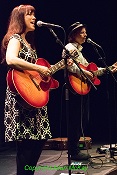 Just before the end of their recent twentieth anniversary tour of the UK, I was lucky enough to chat to Pete and Maura Kennedy at Kings Place in London just after their soundcheck. We talked about how they met, songwriting, technology and a whole lot more. Here’s how it went:
Just before the end of their recent twentieth anniversary tour of the UK, I was lucky enough to chat to Pete and Maura Kennedy at Kings Place in London just after their soundcheck. We talked about how they met, songwriting, technology and a whole lot more. Here’s how it went:
Allan – So, twenty years together this year. I’ve heard the story but I’m sure Music Riot readers will love it. Could you tell them the story of how you met?
Pete – Well, that happened down in Austin, Texas and we always say that the only trouble with Austin is that it’s surrounded by the rest of Texas, because it’s very much a college town and not typical of the American South at all but it’s a very rock ‘n’ roll and folk and songwriter-oriented town. There’s a place called The Continental Club which is the roots music Mecca of America; I was doing a gig there and that’s where the two of us met. First we talked about music, we didn’t actually play or sing and we then met up a day later at a little songwriters gathering and when we did sing together we found out that we loved each other’s songs and we had a bit of a harmony blend and so we started writing but I had to leave right away and play with Nanci Griffith up at Telluride, Colorado. I drove up there through the desert and into The Rockies and I called Maura after the show and we really wanted to get back together. We were talking on the phone and we decided that since we both knew that we loved Buddy Holly, we would meet at the equidistant point between Austin, Texas and Telluride, Colorado and it was Lubbock, Texas which is where Buddy Holly’s from and he’s buried there. We each drove five hundred miles solo with no cellphones, so we didn’t really know that the other person was doing this and we met at Buddy Holly’s grave and we’ve really been together ever since because very shortly after that, Nanci Griffith needed another band member, a female singer to do harmonies and Maura stepped right into that role and so we’ve been working together steadily ever since we first met.
Maura – And when we left for that tour, we were both in her band but, at the airport, she told us we were going to be her support act for that tour, back in 1993, and we’d only written that one song, we didn’t have an act worked up but we didn’t tell her any of this because we didn’t want to blow that opportunity so we bluffed our way through the first couple of gigs.
Pete – The Southport Theatre was the first gig.
Maura – And by the end of the tour we had our first album’s worth of songs.
Allan – That is a great story.
Pete – We always acknowledge Buddy Holly as our patron saint…
Maura – And Nanci Griffith as the bird that pushed the little chickadees out of the nest.
Pete – She was our mentor: no doubt.
Allan – The first time I saw you was actually in this venue two years ago and that year you had one album out, last year between you, you had two albums out, this year it’s three albums. By anyone’s standards that’s pretty good going, so what can you tell me about the three albums?
Maura – For some reason, both of us were on a real writing spree over the last six to eight months and we were both writing together, both writing independently and gathering songs and it was apparent that we had more songs than we needed for one album, but it also looked pretty obvious how the songs would divide up. The songs we were writing together would be on The Kennedys album, which is called “West”, and that came out last month. Then I was working with a published poet out in California; he provided me with all these lyrics that he wrote specifically for me to write music to and these had a different quality so we decided to have all those solo songs on my album “Villanelle”, which is coming out next week. Meanwhile Pete has been working on this, I think it’s his masterpiece, he’s been working on these songs a good five years. It’s a cycle of songs set in New York City and he sings on these. People are used to him releasing instrumental albums but this is a really cool rock ‘n’ roll album and it’s called “The Heart of Gotham” and that’s coming out in June. So rather than take the twentieth anniversary as a moment to look back we charged straight ahead.
Allan – So apart from having three albums of new material, over the years, how do you keep the live shows fresh?
Maura – Oh, that’s easy. For the past few years we’ve been doing all-request shows. Now we’ve got all this new material and we’re playing a lot of that but three albums is more than you can do in one show, so we’re mixing that up and playing a lot of new material this time. We always get people who have come to our shows before and they have requests so we try to honour as many of those as we can but the shows in the past four or five years have been really audience-driven and that keeps it fresh for the ones who come back to more than one show a year and it keeps it really fresh for us; we have to stay on our toes to remember all those songs.
Pete – We literally go through the audience right before the show and write down what people want to hear and that’s the setlist for that night, so every show is different. Right now we’re not doing that format because we have so many new songs we want to introduce those to the audience.
Maura – Although we have been getting some requests and last night we got requests for songs we haven’t played in a very long time, so we were brave and played them and it was fun.
Allan – That’s very like the New Jersey bands, Springsteen and Southside Johnny, they rely a lot on feedback from the audience and the musicians are good enough to do it as well.
Pete – I think because they came up playing in clubs and bars, and there you better play what people want to hear or they’ll throw things at you so you get used to pleasing the crowds, so to speak, and we’re lucky because, and I’m sure Bruce and Southside feel the same way, we have fans who know all our songs and they’ll ask for different songs from our catalogue so we can resurrect those.
Maura – I think maybe a lot of bands will get people who come out and see them once or twice; we have a lot of fans that come to every show that they can and so, to keep it fresh for them, it was a deliberate decision to make it audience-driven, for them more than anything else. It’s good for us too, but it was really to keep them coming back.
Allan – When I looked the twentieth anniversary thing, I looked back to 1995 and I thought that so many things have changed since that period in the music business…
Maura – In the world…
Allan – How have you reacted to the changes that have happened in the music business? Do you think it’s helped or hindered you?
Maura – There are so many different aspects to it. I remember when our very first album came out, “River of Fallen Stars”, it was on the very first Americana chart, there wasn’t such a thing before and nobody really knew what Americana was. At that time, independent artists really had a wide-open doorway into the music industry; radio stations were playing our stuff and there was very varied radio across the United States and I think that was probably true here too, and then things tightened up. The digital thing has really been difficult for a lot of people and I’m sure that our record sales in the traditional outlets are not as healthy as when we started but our audience, the baby boomers largely, are a segment of the population that has always valued music and they consider themselves to be patrons of the arts, so they come to shows and they buy records form us. In fact, I’ve often had people say: ‘How do you make more money, if I buy it from Amazon or from you?’ and they really want to know. I don’t know what we’d do without them, but we’re baby boomers too and we have the same outlook as far as the value of music is concerned.
Allan – It’s certainly my experience that most of the bands I see now aren’t really making any money out of record sales so people feel they have to buy a CD or t-shirt at the gig so that something goes back to the people that are making the music.
Pete – Record shops don’t really exist, in The States anyway, so it’s not like you’d put out a record and you sit back and wait for cheques to roll in (which never happened to us anyway) but that’s not a paradigm that even exists any more, so you really have to be playing gigs, which is OK, it’s been like that ever since the first cavemen were banging on rocks. They went out and played gigs and people gave them vegetables or whatever and this is basically that same system.
Allan – You seem to have embraced the social media side of things as well. I suspect that works well for you.
Maura – When we first started we had a mailing list and we would put stamps on and stick things in the mail and it was very expensive – it would cost about a thousand dollars to send out one mailer. One really good aspect of the digital world is that we’re able to contact our fans directly at no cost and what happened over the years is that we went from just putting out an electronic newsletter to embracing a number of social media outlets, not all of them, but the ones our fans use, Twitter and Facebook and I think what’s really important, and it’s worked for us, is to take a multi-pronged approach and get the word out in all the different realms. That way you’ll get a couple of people here, a couple of people there; it’s still word of mouth for us, it’s just that it’s digital now.
Allan – I can certainly see with your fans that social media enables you to create a community. It’s not so much artist and audience it’s everybody in it together.
Maura – People post photos and videos and they make song requests via social media and so they really do feel a part of it. One thing I do a lot if we’re coming to a town and ticket sales might not be as robust as we’d like, I’ll say ‘Hey guys, tell your friends we could really use your help on this show and we’ll love you forever’. And I find people really want to help; they do get the word out, they share that information and they really have a hand in helping us in more ways than just buying tickets and records.
Allan – It struck that your music seems to cross an awful lot of boundaries. How would you define it and who would you say has influenced you, apart from Buddy Holly?
Pete – Maura mentioned that we were on the first Americana chart and when we saw that we immediately had our own definition of Americana. A different one developed that was sort twangy, honky-tonk country and was restricted to just that and we never felt that was the entire breadth of American music. We do that stuff, our song “West” is a twangy country song because we love Gram and Emmylou and Buck Owens and Merle Haggard and stuff like that, but we don’t restrict ourselves to that at all. So we include George Gershwin and soul and jazz – that’s one of the great American art forms along with blues and rock ‘n’ roll and gospel; those things are all tied in together so Americana encompasses all of that stuff. Even “Closer Than You Know” has a kind of impressionistic feel to it and that’s Duke Ellington and Billy Strayhorn who were very heavily influenced by French Impressionism, so that brings that in too. Someone said the other day ‘You play a little Spanish sometimes’ and I said ‘Well, if you go down to the border of Texas, that’s the way people play down there’. So we’re trying to cover the entire geography because that’s what we do in our car and we try to do it musically too. We have the broadest possible definition of Americana.
Allan – Do you have a particular method of writing that you always use?
Maura – No, and that’s a real blessing; because we write in different ways, the music evolves over time. Our very first songs that we wrote together, “Day In and Day Out” was the very first song we wrote together, Pete gave me the title and I sang the title back to him and we wrote everything, music and words, together. The second song that we wrote together was “River of Fallen Stars” and he gave me an entire lyric sheet and I put a melody to that. On the album “Closer than You Know”, for a lot of those songs, Pete had recorded instrumental tracks with form but no melody and no words and I would put the whole song to that. On my new record, “Villanelle”, these are all lyrics that were sent to me by this poet B.D. Love and they’re in poem forms, forms I would never write in, so I’m trying to stay very true to the poetic forms and still make them sound like songs. Pete will sometimes write music first and sometimes lyrics, so we mix it all up. We try to not fall into a formula.
Allan – And what will the future bring? Next year four albums?
Maura – That’s a good question. We never know but we’re always really open and we always try and go with the flow. If you had asked us that question twelve months ago we wouldn’t have known we had three albums coming out; that came together in the last nine or ten months. So we don’t know but I’m sure it’ll be fun.
Allan – One last question. Do you have a song that makes you cry?
Maura – I’ve cried a lot singing songs. “When I Go” by Dave Carter is one of them. They change all the time. “I’ll Come Over” is a good example; that’s a song to my best friend and if I know somebody’s having trouble, I’ll dedicate it to them. I’ll start singing it and I’ll start crying; songs like that I can’t even talk about. And unfortunately, that was all we had time for before Pete and Maura had to get ready to go out and do their thing.
“West” and “Villanelle” are out now and “The Heart of Gotham” is out in June.
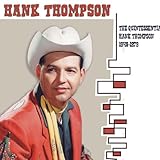 Normally, Closet Classics would feature an album but I think this song deserves its own CC feature. “The Wild Side of Life” is a classic country song, which alienates most of the music snobs instantly. It’s great to see that country has finally become accessible, songwriters in the UK are admitting to being influenced by it and it’s hard to believe now that for decades the genre was seen as a bad joke.
Normally, Closet Classics would feature an album but I think this song deserves its own CC feature. “The Wild Side of Life” is a classic country song, which alienates most of the music snobs instantly. It’s great to see that country has finally become accessible, songwriters in the UK are admitting to being influenced by it and it’s hard to believe now that for decades the genre was seen as a bad joke.
This song played a huge part in my childhood. Country music has always been popular in Scotland. I’ve got a few theories about that, but I’m sure the sociologists and musicologists can give you much better-researched explanations; here’s a personal perspective.
In 60s and 70s Scotland there was a great tradition of families and friends gathering (usually after the pubs closed, which was 10 o’clock in those days) to sing songs and tell jokes, and maybe have a wee dram or two. Most of the songs were country: “Crying Time”, “Please Help Me I’m Falling”, “From a Jack to a King”, “He’ll Have to Go” and the occasional standard like “Summertime”. Everyone had their own song which they performed at every session. I’m guessing that they picked up those songs from American Forces Network (AFN) radio, American military bases and artists playing in working men’s and ex-servicemen’s clubs. However they did it, they learned those songs and passed them on in the age-old oral tradition. A lot of those songs made it on to the club circuit because you didn’t have to be a great guitar player to do passable job of supporting your voice with a few chords on an acoustic guitar to sell a good song; depending on your vocal range, you could get by with C, F and G at a push. Some combinations of those letters might have even helped you with hecklers.
So why “The Wild Side of Life”? Really simple, it was one of my grandad’s songs and he could really sing (and he fought in a world war, got shot, went to New York, and won a Fife Junior Cup football medal as well); when you grow up hearing a great song delivered with feeling by someone with a good voice, then it’s going to stick for life. And you’ve probably guessed that there was a bit of hero-worship in there as well. So the song was stuck in my consciousness and it wasn’t going away and, although the early 70s seemed to be a country-free zone on the surface (apart from the schlock that made the UK charts), my favourite singers and songwriters (Neil Young and Jackson Browne, for example) were heavily influenced by country singers; Neil Young even covered “Oh, Lonesome Me”. Towards the end of the 70s, it became acceptable to like “The Wild Side of Life” when it was covered by such rock tastemakers as Status Quo and Rod Stewart, but I was there way before all of those denim boys and feather cut fancy dans because I loved the original.
The classic version of the song, for me anyway, is the 1952 version by Hank Thompson, whose plaintive vocal perfectly matches the theme of loss in the song, but there are dozens of others by country artists before you even start to look at pop covers. The song even generated one of the earliest answer songs in Kitty Wells’ “Wasn’t God Who Made Honky Tonk Angels”, which was also a No. 1 in 1952. As the 70s morphed into the 80s, more country acts crossed over into the mainstream and artists like Carlene Carter, Rodney Crowell and Rosanne Cash along with the bad boys like Willie Nelson and Merle Haggard. Even angry young man Elvis Costello did an album of country covers and it was ok to admit that you always loved country music.
That should have been the end of the story, but there was still another twist. When I moved to London and worked with people whose parents came to the UK from the Caribbean, I discovered that they grew up listening to the same music that I had listened to as a kid in a Fife mining village. Now, that was a weird sensation; discovering a completely unsuspected common musical heritage with friends from a completely different background and maybe that says something about music being able to break down all sorts of barriers. Of course, the whole idea of country being big in the Caribbean in the 50s is old news now that Trevor Nelson has spoken about it, but it came as quite a shock at the time.
As for the song, well, whenever I pick up a guitar and start playing, it usually manages to poke its head in there and it’s a challenge to try to find a musical style you can’t fit it into. And it’s such a great song that it can make a mediocre player and singer sound reasonable. What more do you want?


